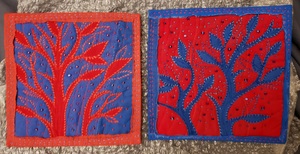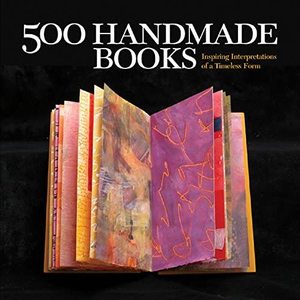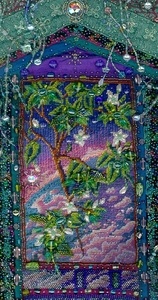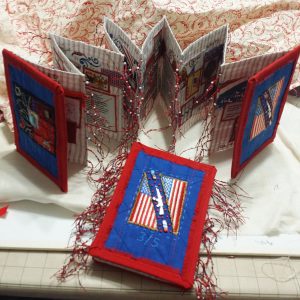Tl;dr…Why ‘Outsider Artists’ *should* enter prestigious contests, and why many marginalized artists either give up or never even consider these opportunities.
Every year I apply for every reputable art-related grant or show opportunity I might remotely qualify to enter. I usually don’t pay, unless the entry fees are modest (under $35 per entry).
I do this because, as a mid-career/mature fine-crafts artist and genre writer, I must expand my portfolio and profile to be taken seriously.
I am an ‘Outsider Artist’. I come from a non-art background, and I most often work in still largely marginalized craft media (beads and thread). I don’t make the bulk of my living from art, but from blue-collar manufacturing…and I have no plans to change that balance.
Why? Manufacturing is more lucrative for me than my art or writing. The former has benefits and a 401K. I still call myself an artist and a writer in some worlds, but out in the real world I just say “I’m a welder” because I don’t get stigmatized or idealized the way writer or artist would be applied.
Welding as a skillset is awesome.
It gets me a different type of notice, one that code-switches more easily between different American castes. (You think we don’t have caste in this country? How innocent and quaint.)
I don’t have an academic teaching record in the arts, gallery curator experience, a ‘fine art’ portfolio, or representation with a large famous gallery. I have one AA degree in graphic arts, and two-thirds of a BA (abandoned as a waste of money before 2000s-era credentialism made even unrelated Bachelors degrees necessary for many scut jobs. I might revisit that BA degree.)
I *do* have lots of real-world experience & ongoing skills certifications, only some of which pertain to art.
I’ve been in a few nationwide art shows, and some great brick-and-mortar fine craft galleries in Arizona, New Mexico, and New York.

My artwork has been published in national fine craft magazines and some excellent ‘coffee table’ art books.

I have three very dedicated art agents who have placed my art with over two dozen university special collections libraries, several museums, and numerous private and corporate collectors around the world.

In terms of output, since 1997 I’ve completed over 230 book art pieces…most of which have been sold. For real money.
I’m happy to announce that by September 2021, I will have artwork in a Santa Fe, New Mexico art gallery. (This is still a big thing for many artists, because Santa Fe is a luxury tourist destination).
Why list these achievements?
To prove I’m not an emerging artist, but a mid-career artist with an actual track record.

Artists MUST promote themselves effectively, without slipping into annoying-spammer territory. Nobody else will promote us, until we do it first. No one else knows we exist!
Part of that promotion is applying for juried art shows and grants opportunities.
It can be a long shot. Shows can have big associated costs (travel, food, booth costs, the sheer cost of making enough artwork to sell).
Private or government grants are hotly fought over, with only a few slots and many entrants. Putting together a grant application is stressful enough to be good practice for a thesis paper.
The rewards can be amazing: art grants can run from $500 up to $50,000+, and come with career-boosting promotional opportunities. Well-marketed, juried, and attended art shows can earn decent incomes for artists. Pre-Covid, I knew five artists who each cleared $100K a year in art show sales.
The intangible benefits are many, but the most noticeable is a thick skin.
I’ll be honest. Every grant and show rejection stings a bit. But I spread out the pain with more than one entry per year, and a rolling program of entries that helps me stay focused on the Next One.
Instead of agonizing long-term over one rejection notice, I tend to pick myself up after a day’s sulking. There are always more contests, and more artwork that needs to be finished.
I can’t sell art if I don’t finish it.
More importantly, no one else can effectively assess my unfinished art…or my current level of artistic skill. I would do what I do, anyway, but that outside assessment gives me useful validation and critique.
It took time to reach that mindset. I *still* sulk a bit over four rejections in my art career, even as I realize how they helped spur me to be a better artist in my tiny niche.
The first gallery, in 2005, loftily told me there was no market for my small art pieces. ‘We sell big art for big houses’. That made me double down on handheld artworks. I’ve also never set foot back in that local Arizona business.
Another out of state gallery is long out of business, after three progressively more disastrous changes in ownership. I dodged a bullet there. Many of their artists are still rebuilding careers.
Another, also out of state, has effectively said, “Don’t call us, we’ll call you”…and now I’m not sure I’d answer if they called me.
The last, which I’d thought was a sure thing, ended up ghosting me two years ago…or were so incompetent they lost my art submissions. Or they’re a cooperative gallery, and I’m not really interested in that kind of pay-to-show. Maybe they have the foot traffic and return clientele to make co-op fees worth it. They’re smack in the middle of some AZ’s most lucrative retail streetscapes. I’ll do more research to find out, before I write them off.
#
The other reason to apply for reputable grants and juried art shows? They get you noticed by art-world people like art agents, gallery curators, respected researchers, and top-tier collectors.
Even if you don’t win that grant or get into that show, getting noticed can help build later opportunities.
Me putting artwork into two respected Santa Fe galleries in 2021 is a direct result of a meeting with another book artist at a conference in 2005.
One point to make: I knew these options existed.
A lot of marginalized artists and writers don’t. They don’t read the ‘right’ kind of magazines or online forums, to see calls for entry. They don’t know how to search online for those calls. They don’t know the people who might refer those opportunities. They might not have the English-language skills to write up a compelling, readable entry application. They might not be able to weed out real opportunities from scams.
Or, they might know, yet self-censor and not bother to enter. They might think they’re not eligible for a show spot or a grant. The financial and time barriers to entry might be too much (I have been there!)
Thankfully, more opportunities for marginalized artists exist now. People just have to look for and apply for them.
I’d recommend SFWA as a starting point for writers. Here’s a recent online discussion of how genre publishing has become more diverse.
Here’s another reason to grab at these chances: their future funding levels might be based partly on the numbers of applicants. More applicants to a show, grant, or publishing slot might mean a publisher or non-profit can go to its funders and government arts councils, and ask for more money…which means more opportunities for creators.
Let’s look at opportunities for genre writers from marginalized backgrounds, circa 2021.
Genre literature (specifically Romance, Science Fiction, Fantasy, and Horror) is climbing slowly out of its century-or-more of white colonial mindsets.
We have POC & LGBTQ+ writers winning major publishing industry awards, launching celebrated books and media properties, and reaching leadership levels in major publishing and media companies. Online and in-person conventions for marginalized writers and artists are helping create more networking. Scholarships exist for prestigious and career-forging workshop opportunities.
There’s resentful pushback from people who would rather see the system stay unchanged.
Not all of it from people you might expect to see wearing white pointy hoods, either.
A portion of the Trump supporters who engaged in the 1/6/2021 Washington DC coup attempt were POC, and conservative POC pundits still try to downplay the racism and hatred often present within conservative culture.
Some of that comes from self-serving behavior, the view of “I had to suffer to succeed, why should other people get opportunities handed to them?”
Some of these people operate (possibly subconsciously) on appeasement-of-oppressors, hoping that if they play along they can join the club. At best, they tend to be tokens, trotted out by conservative establishments whenever necessary. But these sympathizers are always a heartbeat away from savage attacks by other conservatives.
I don’t view art and writing as a zero-sum game. More opportunities mean better art, media, and books for all of us.
I don’t want artists to suffer. It doesn’t help their art or their lifespans. I know this intimately, from my own life as well as watching friends spiral too soon down into Entropy.
Saying glibly: “Well, if they want to be an artist badly enough, they’ll find a way” or praising ‘late-blooming creators’ cruelly diminishes those artists who ache to create, but can’t. For any number of completely legitimate reasons.
They don’t have money for materials, or to enter shows.
They don’t have childcare or eldercare, to give them a break for creative time.
They work so many hours at a job/jobs, they don’t have time.
Their family members undercut and sabotage their creative efforts.
Their health and finances fail before they ever get that chance to ‘bloom’.
Study after study has shown that even a modest basic income boost helps people reach better health outcomes, work performance, and entrepreneurship. Duh, this is why artists and writers chase grants and large-advance publication contracts!
#
I don’t claim a multicultural heritage because I wasn’t reared within it. So I’m a white woman from a background prizing science and literacy. My family & loved ones have supported my creativity. I’ve had enormous privileges in my art and writing careers (most of which I’ve squandered, one way or the other).
When I see resentment from fellow white authors and artists, about marginalized creators getting any kind of break, I see that as a projection of their own feared or real inadequacy.
The core difference between conservative and progressive mindsets, in my 50+ years of experience? Look at how each greets unfamiliar words and experiences.
Conservative mindsets tend to value conformity while avoiding new experiences, and often equate ‘not knowing’ with failure or mockery.
Progressive mindsets tend to focus more on valuing discovery, curiosity, and ‘fair play’.
In art and genre writing, the very people yelling the most about ‘entitlement’, tend to be the ones who threw away their own best outcomes.
The rest of us will be enjoying some brilliant art and writing from our fellow creators.